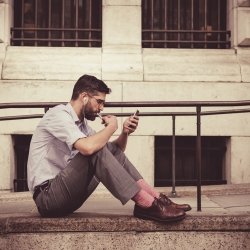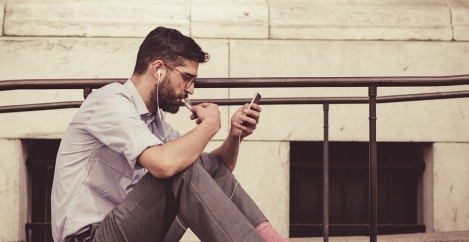March 8, 2022
Workplace apps make it difficult for people to switch off
 A new survey claims that workers with access to workplace platforms and apps on their personal devices check notifications more regularly out of office hours than those without access. The Digital Detox survey, conducted by Just Eat for Business, claims to uncover workers’ habits towards breaks and computer use, focusing on screen time. The study also includes expert comments on the mental impact of skipping breaks, and offers advice on how to combat it.
A new survey claims that workers with access to workplace platforms and apps on their personal devices check notifications more regularly out of office hours than those without access. The Digital Detox survey, conducted by Just Eat for Business, claims to uncover workers’ habits towards breaks and computer use, focusing on screen time. The study also includes expert comments on the mental impact of skipping breaks, and offers advice on how to combat it.
The survey found that of those who have access to their work platforms and apps – such as Slack and Microsoft Teams – 28 percent check their notifications once an hour while off the clock, while of those who don’t have access, 39 percent check them less than once every four hours. Having access to work notifications outside of office hours, on annual leave or an evening for example, appears to affect work/life balance for both employers and employees.
Of those who check work notifications once an hour, 34 percent say they often struggle to switch off after work. Meanwhile, of those who check their notifications less than once every 4 hours, 48 percent – almost half – report that they rarely struggle to switch off.
There also appears to be a correlation between those who stay engaged with work out-of-hours and those who feel burnt out, with 49 percent of those who regularly check their notifications also admitting that they sometimes experience burn out at work.
Dr Brad McKenna (University of East Anglia) and Dr Wenjie Cai (University of Greenwich), offer advice on how employers and employees could establish boundaries between work and home life: “Emails outside of work hours should be discouraged to set a clear boundary between working hours and home life. Emails sent outside of working hours could be set to send during working hours. France has been doing this for a while and more recently Portugal. If someone is working flexible hours outside of regular working hours their email signature could say something like “there is no expectation to reply outside of regular working hours.”
Dr Anneli Gascoyne, Professor in Occupational Psychology at Goldsmiths University, commented on the impact of constant engagement with our devices, and how to improve our relationship with them: “We’re pinged by notifications and provided with plenty of opportunities for distractions away from our priorities, whether emails, slack, social media etc. etc. There are lots of ways that we can address this, which can start with steps as simple as turning off notifications that grab our attention.
There are also lots of tools that are designed to help us with better habits, such as digital detox/wellbeing apps that limit or temporarily block screen or app use. We can make proactive decisions such as choosing two specific times of the day to check emails and dedicating focus to them at that time only. And perhaps even keeping our phones on airplane mode while we’re needing to concentrate.”













